人教版七年级下册英语Unit5知识点63749
Unit5知识归纳人教版七年级英语下册
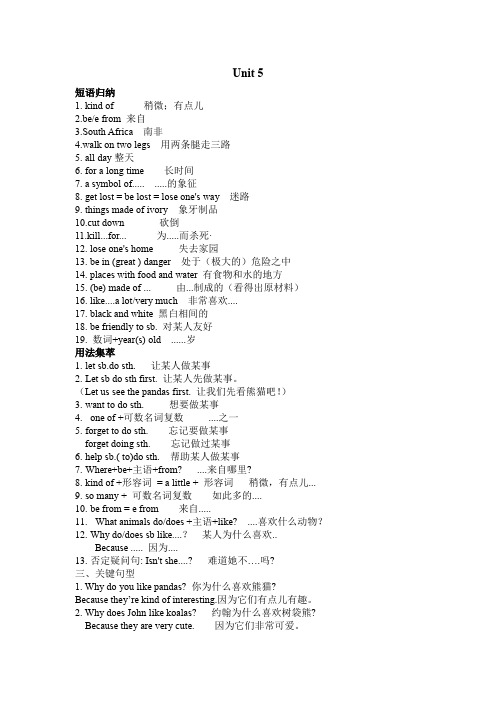
Unit 5短语归纳1. kind of 稍微;有点儿2.be/e from 来自3.South Africa 南非4.walk on two legs 用两条腿走三路5. all day整天6. for a long time 长时间7. a symbol of..... .....的象征8. get lost = be lost = lose one's way 迷路9. things made of ivory 象牙制品10.cut down 砍倒11.kill...for... 为.....而杀死·12. lose one's home 失去家园13. be in (great ) danger 处于(极大的)危险之中14. places with food and water 有食物和水的地方15. (be) made of ... 由...制成的(看得出原材料)16. like....a lot/very much 非常喜欢....17. black and white 黑白相间的18. be friendly to sb. 对某人友好19. 数词+year(s) old ......岁用法集萃1.let sb.do sth. 让某人做某事2.Let sb do sth first. 让某人先做某事。
(Let us see the pandas first. 让我们先看熊猫吧!)3.want to do sth. 想要做某事4.one of +可数名词复数....之一5.forget to do sth. 忘记要做某事forget doing sth. 忘记做过某事6.help sb.( to)do sth. 帮助某人做某事7.Where+be+主语+from? ....来自哪里?8.kind of +形容词= a little + 形容词稍微,有点儿...9.so many + 可数名词复数如此多的....10.be from = e from 来自.....11.What animals do/does +主语+like? ....喜欢什么动物?12.Why do/does sb like....?某人为什么喜欢..Because ..... 因为....13.否定疑问句: Isn't she....? 难道她不….吗?三、关键句型1. Why do you like pandas? 你为什么喜欢熊猫?Because they’re kind of interesting.因为它们有点儿有趣。
七年级英语下册Unit5单元知识点

七年级英语下册Unit5单元知识点Unit 5是七年级英语下册中的一个重要单元,这个单元中包含了大量的知识点。
以下是对Unit5单元知识点的详细介绍。
一、语法知识点1. 语态:被动语态的构成及用法被动语态的构成:be动词 + 过去分词被动语态的用法:强调动作的动作的受动方,而非主动方。
例如:The book was written by him.(这本书是他写的)2. 疑问句及其回答疑问句的构成:be动词/助动词/情态动词+主语+动词原形+其他?Yes/No + 主语 + be动词/助动词/情态动词。
例如:- Are you a student?- Yes, I am.- Do you like hamburgers?- No, I don’t.3. 特殊疑问句及其回答特殊疑问句的构成:疑问词(who/what/where/when/why/how)+ be动词/助动词/情态动词+主语+动词原形+其他?疑问词 + 主语 + be动词/助动词/情态动词。
例如:- What is your favorite color?- My favorite color is blue.- Where do you live?- I live in New York.二、词汇知识点1. 动词短语动词短语是指由动词和其它成分组成的短语,常用于描述动作、状态或动作的完成情况等。
例如:look after(照顾)、enjoy doing(喜欢做某事)、get up (起床)2. 形容词形容词是指用来修饰名词或代词的词语,可以描述名词或代词的性质、特点等。
例如:happy(快乐的)、hungry(饥饿的)、dirty(脏的)3. 名词名词是指用来表示人、事、物、地点等的词语,常用于构成句子的主语、宾语等成分。
例如:book(书)、teacher(老师)、classroom(教室)三、阅读理解阅读理解是指通过阅读一段文章,理解其中的意思并回答问题的能力。
完整版)人教版七年级英语下册第五单元知识点总结
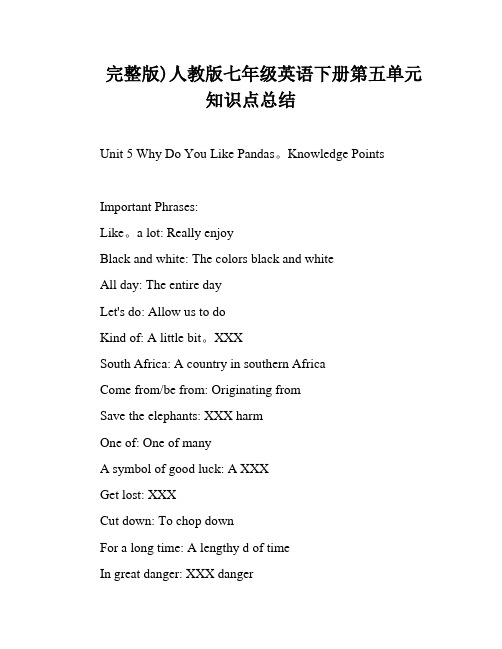
完整版)人教版七年级英语下册第五单元知识点总结Unit 5 Why Do You Like Pandas。
Knowledge PointsImportant Phrases:Like。
a lot: Really enjoyBlack and white: The colors black and whiteAll day: The entire dayLet's do: Allow us to doKind of: A little bit。
XXXSouth Africa: A country in southern AfricaCome from/be from: Originating fromSave the elephants: XXX harmOne of: One of manyA symbol of good luck: A XXXGet lost: XXXCut down: To chop downFor a long time: A lengthy d of timeIn great danger: XXX dangerXXX ivory: XXXPlaces with food and water: XXX sustenanceKill。
for: To take the life of an animal for a specific purpose1.Seeing Pandas: Observing pandas2.My Favorite Animals: XXX XXX3.e to SP: Greetings to SP4.e Back to SP: Greetings to SP upon returning5.From: Originating from6.In the Zoo: Located in a zoo7.On the Farm: Located on a farm8.My New Pet: XXX9.XXX: Bipedal movement10.Kind of: XXX11.Kind of Interesting: XXX12.A XXX: XXX13.A Little Boring: XXX14.A Kind of: A type of15.All Kinds of: Many different types of16.All Day: The entire day17.A Good Name for XXX: A fitting name for a person18.South Africa: A country in southern Africa19.South China: The southern n of China20.South America: The southern n of the Americas21.America。
七年级下册英语人教版unit5知识点
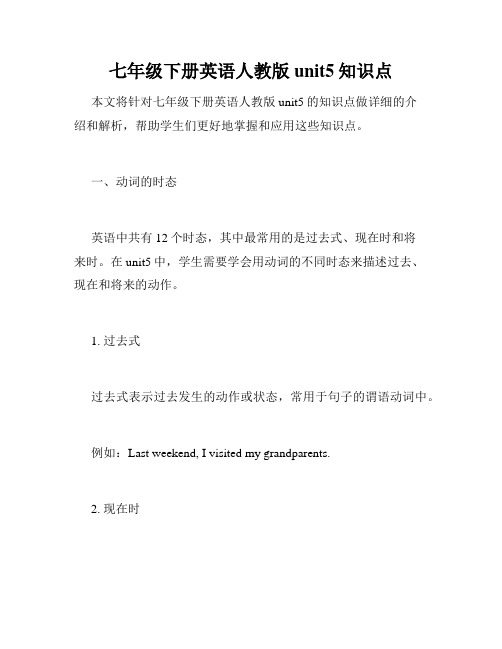
七年级下册英语人教版unit5知识点本文将针对七年级下册英语人教版unit5的知识点做详细的介绍和解析,帮助学生们更好地掌握和应用这些知识点。
一、动词的时态英语中共有12个时态,其中最常用的是过去式、现在时和将来时。
在unit5中,学生需要学会用动词的不同时态来描述过去、现在和将来的动作。
1. 过去式过去式表示过去发生的动作或状态,常用于句子的谓语动词中。
例如:Last weekend, I visited my grandparents.2. 现在时现在时表示现在正在进行或习惯性的动作,常用于句子的谓语动词中。
例如:I usually have breakfast at 7 o'clock in the morning.3. 将来时将来时表示将来要发生的动作或状态,常用于句子的谓语动词中。
例如:I will go to the cinema with my friends tomorrow evening.二、形容词和副词的用法形容词和副词在语言中非常常用,它们用于修饰名词或动词,可以使语言更加生动、形象,并且更好地传达作者的意图。
1. 形容词形容词用于修饰名词,表示该名词的某种特征或属性。
例如:I love this beautiful flower.2. 副词副词用于修饰动词、形容词或其他副词,表示某个动作或状态的程度、方式或时间等。
例如:The girl sings beautifully.三、疑问词的用法疑问词用于构成疑问句,在英语中有很多不同的疑问词,比如who、what、when、where、why等。
学生需要学会这些疑问词的用法和搭配。
例如:What is your favorite color?四、短语动词的用法短语动词是由一个动词和一个或多个介词、副词组合而成的,具有固定的词组搭配,是英语中非常常用的一种语言形式。
例如:The teacher asked the students to turn off their phones.五、时态和语态的转换学生需要学会将动词的时态和语态进行转换,以便更好地表达自己的意思。
人教版七年级英语下册Unit5知识点归纳

Unit5 Why do you like pandas?知识点归纳一、重点短语1. importance in Thailand 在泰国的重要性2. Let’s see…. first. 让我们先看...3. favorite animals 最喜欢的动物4. kind of interesting 有点有趣5. South Africa 南非6. be from =come from 来自7. be smart 聪明的8. walk on two legs 用两条腿走9. all day/all night 整天/整夜10. a good name for her 对于她是个好名字11. like …a lot 非常喜欢......12. black and white 黑白相间13. You’re right. 你是正确的。
14. one of +名词复数(......其中之一)15. our first flag 我们的第一面旗16. a symbol of good luck 好运的象征17. draw well 画得好18. forget to do 忘记做某事19. get/be lost 迷路20. places with food and water有食物和水的地方21. be in great danger 处于危险22. cut down 砍倒23. over = more than 超过/多于24 be made of... 由…制成25.Thai Elephant Day 大象二、用法归纳1. —Why…? 为什么……?—Because… 因为……2. let sb. do sth. 让某人做某事3. want to do sth. 想要做某事4. one of+名词复数……之一5. forget to do sth. 忘记要做某事6. forget doing sth. 忘记做过某事7. help sb. (to) do sth. 帮助某人做某事8. be friendly to sb. 对某人友好三、重点句子1. —Why do you like pandas? 你为什么喜欢熊猫?—Because they’re kind of interesting. 因为它们有点儿有趣。
(完整版)人教版七年级英语下册Unit5知识点讲解
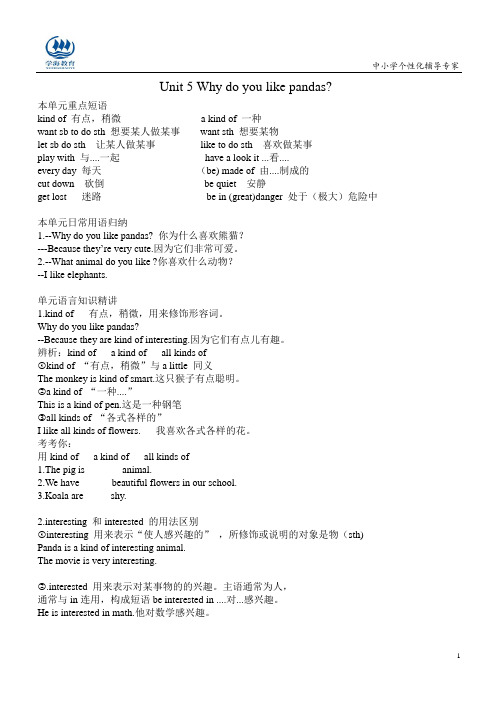
Unit 5 Why do you like pandas?本单元重点短语kind of 有点,稍微 a kind of 一种want sb to do sth 想要某人做某事want sth 想要某物let sb do sth 让某人做某事like to do sth 喜欢做某事play with 与....一起have a look it ...看....every day 每天(be) made of 由....制成的cut down 砍倒be quiet 安静get lost 迷路be in (great)danger 处于(极大)危险中本单元日常用语归纳1.--Why do you like pandas? 你为什么喜欢熊猫?---Because they’re very cute.因为它们非常可爱。
2.--What animal do you like ?你喜欢什么动物?--I like elephants.单元语言知识精讲1.kind of 有点,稍微,用来修饰形容词。
Why do you like pandas?--Because they are kind of interesting.因为它们有点儿有趣。
辨析:kind of a kind of all kinds of①kind of “有点,稍微”与a little 同义The monkey is kind of smart.这只猴子有点聪明。
②a kind of “一种....”This is a kind of pen.这是一种钢笔③all kinds of “各式各样的”I like all kinds of flowers. 我喜欢各式各样的花。
考考你:用kind of a kind of all kinds of1.The pig is _______animal.2.We have ______beautiful flowers in our school.3.Koala are _____shy.2.interesting 和interested 的用法区别①interesting 用来表示“使人感兴趣的”,所修饰或说明的对象是物(sth) Panda is a kind of interesting animal.The movie is very interesting.②.interested 用来表示对某事物的的兴趣。
人教版七年级英语下册第五单元知识点汇总
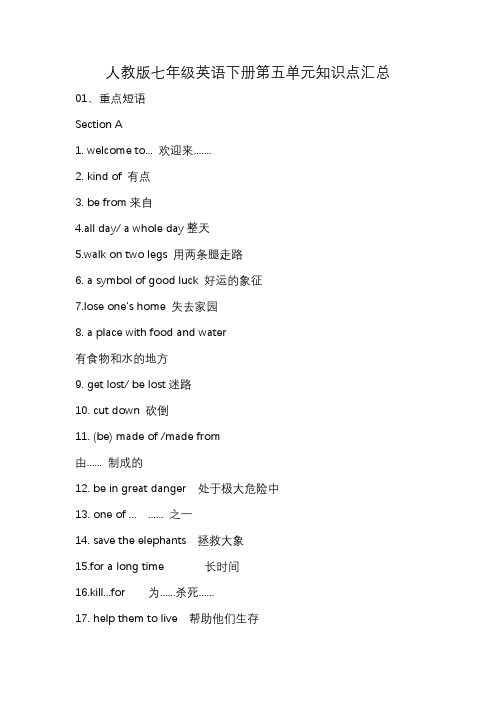
人教版七年级英语下册第五单元知识点汇总01、重点短语Section A1. welcome to... 欢迎来.......2. kind of 有点3. be from来自4.all day/ a whole day整天5.walk on two legs 用两条腿走路6. a symbol of good luck 好运的象征7.lose one’s home 失去家园8. a place with food and water有食物和水的地方9. get lost/ be lost迷路10. cut down 砍倒11. (be) made of /made from由...... 制成的12. be in great danger 处于极大危险中13. one of ... ...... 之一14. save the elephants 拯救大象15.for a long time 长时间16.kill...for 为......杀死......17. help them to live 帮助他们生存18.really scary很吓人19. South Africa 南非02、重点句子Grammar Focus 句子1. Why do you like pandas?你为什么喜欢熊猫?Because they’re kind of interesting.因为他们有点儿有趣2. Why does John like koalas?约翰为什么喜欢考拉?Because they’re very cute.因为它们非常可爱。
3. Why don’t you like tigers?你什么不喜欢老虎?Because they’re really scary.因为他们确实吓人。
4. Where are lions from?狮子来自哪里?They’re from South Africa.他们来自南非。
人教版七年级英语下册Unit5重点知识点总结.docx

.精品文档 .人教版七年级英语下册Unit5 重点知识点总结人教版七年级英语下册Unit 5 重点知识点总结Unit 5 I ’ wathing TV.一、词组d hewrk做家庭作业wath TV看电视eat dinner吃饭;就餐lean the r打扫房间read newspaper/a bk看报纸/看书g t the vies看电影write a letter写信wait fr等待;等候talk abut谈论。
play basketball/ser/打篮球/踢足球take phts拍照TV shw 电视节目Se f 。
中的一些a pht f y faily我的家庭照at shl 在学校be with和。
一起.精品文档 .in the tree在上二、句型(1)-hat+be+主+ding?⋯ .正在做什么?-主+ be+ding 。
⋯正在做某事。
例:- what are yu ding?-I ’ ding y hewrk.(2)-Thanks fr⋯。
而感例: Thanks fr yur letter.(3)-Here are/is⋯例: Here are se f y phts.Here is a pht f y faily.(4)-That sunds gd.(5)-This TV shw is bring.三、日常交用(1)-D yu want t g t the vies?– Sure.(2)-hen d yu want t g?– Let ’ s g at seven.(3)-here d peple play basketball?–At shl.(4)-hat’ s he waiting fr?-He’ s waiting fr a bus.(5)-hat’ s he reading? He’ s reading a newspaper.1)在在行的形式是:助 be(a,is,are)+-ing形式(也叫在分),表示在(的瞬)正在行或生的作。
- 1、下载文档前请自行甄别文档内容的完整性,平台不提供额外的编辑、内容补充、找答案等附加服务。
- 2、"仅部分预览"的文档,不可在线预览部分如存在完整性等问题,可反馈申请退款(可完整预览的文档不适用该条件!)。
- 3、如文档侵犯您的权益,请联系客服反馈,我们会尽快为您处理(人工客服工作时间:9:00-18:30)。
Unit5名词:panda 熊猫zoo 动物园tiger 老虎elephant 大象lion 狮子giraffe 长颈鹿animal 动物kind 种类Australia 澳大利亚Africa 非洲pet 宠物leg 腿cat 猫flag 旗;旗帜place 地点;位置water 水danger 危险tree 树动词:save 救forget 忘记cut 砍;切kill 杀死形容词:cute 可爱的;机灵的lazy 懒散的;懒惰的smart 聪明的beautiful 美丽的;美好的friendly 友好的shy 害羞的;腼腆的介词:over 超过;多于;在……正上方兼类词:south adj 南方的;n 南;南方sleep v&n 睡觉down adv (坐、躺、倒)下;prep 向下;沿着短语:kind of 稍微;有点儿South Africa 南非get lost 迷路cut down 砍倒be in(great)danger 处于(极大)危险之中(be)made of 由……制成的知识点:1、Let's do sth 让我们做某事吧!Let's = Let usLet's not do sth 让我们不要做某事!Let's go swimming!咱们去游泳吧!Let's play soccer!咱们去踢足球吧!Let's not tell him. 咱们不要告诉他。
Let's not play volleyball. 咱们不要打排球。
Let's go shopping!咱们去购物吧!答语:接受建议:Good idea./Sure./OK.不接受建议:Sorry, I……2、favorite adj. 最喜爱的;特别喜爱的n. 最喜欢的人或事物What's your favorite + 名词=What + 名词+ do you like best 你最喜欢的……是什么My favorite + 名词+ is/are……我最喜爱的……是……名词+ is/are my favorite. ……是我最喜爱的。
What's your favorite food =What food do you like best你最喜欢的食物是什么What's your favorite animal=What animal do you like best你最喜欢的动物是什么My favorite food is apple. 我最喜欢的食物是苹果。
My favorite animal are pandas. 我最喜爱的动物是熊猫。
Ice cream is my favorite. 冰淇淋是我的最爱。
3、Why引导的特殊疑问句,用来询问原因问:Why + 一般疑问句答:Because + 原因。
Why do + I/you/we/they/复数+ 动词原形+ 其他为什么我/你/我们/他们/复数……Why does + he/she/it/单数+ 动词原形+ 其他为什么他/她/它/单数……Why don't + you/we/they/复数+ 动词原形+ 其他为什么我/你/我们/他们不……Why doesn't + he/she/it/单数+ 动词原形+ 其他为什么他/她/它/单数不……—Why do you like .—Because it is interesting. —为什么你喜欢体育—因为它令人兴奋。
—Why does she like pandas—Because they are cute.—为什么她喜欢熊猫—因为它们很可爱。
—Why don't they like the movie—Because it's boring.—为什么他们不喜欢这不电影—因为它很无聊。
—Why doesn't he play tennis—Because it's difficult.—为什么他不打网球—因为它太难了。
4、because表述原因I like elephants because they are clever. 我喜欢大象,因为它们很聪明。
I don't like this movie because it's boring. 我不喜欢这个电影,因为它太无聊了。
注意:because和so不能同时出现在一个句子里。
Because the sweater is too expensive, so I don't want to buy it. (×)I don't want to buy the sweater because it is expensive. 我不想买这件毛衣,因为它太贵了。
The sweater is expensive, so I don't want to it. 这件毛衣太贵了,所以我不想买它。
5、kind 种类a kind of 一种+ 可数名词单数/不可数名词many kinds of 许多种+ 可数名词复数all kinds of 各种各样的+ 可数名词复数Lily has many kinds of toys. Lily有许多种玩具。
They sell all kinds of things. 他们出售各种各样的物品。
It is a kind of animal. 它是一种动物。
注意: a kind of 一种+ 可数名词kind of 稍微;有点儿+ 形容词/副词This is a kind of fruit. 它是一种水果。
It is kind of cute. 它有点儿可爱。
This is job and it is interesting.6、Where引导的特殊疑问句询问来自哪里问:Where + be动词+ 主语+ from答:主语+ be from + 地点. 或直接回答地点—Where are you/they from—I/We/They are from Canada. 我/我们/他们来自加拿大。
—Where is he/she/it/Tom from—He /She/It/Tom is from Australia. 他/她/它/Tom来自澳大利亚。
7、来自be from + 地点come from + 地点He is from Taiwan. = He comes from Taiwan.他来自台湾。
They are from Hong Kong. = They comes from Hong Kong. 他们来自香港。
8、sleep v&n 睡觉asleep adj 睡着的go to sleep 睡着fall asleep 睡着go to bed 上床睡觉I sleep eight hours every night. 我每晚睡八个小时。
I sometimes have a sleep in the afternoon. 我有时在下午睡觉。
Don't sleep in class.不要再课堂上睡觉。
He goes to sleep/bed at 9 o'clock. 他在9点上床睡觉/睡着。
I don't know when I fell asleep last night. 我不知道昨晚什么时候睡着的。
9、七大洲Asia 亚洲Europe 欧洲Africa 非洲 Oceania 大洋洲 North America 北美洲 South America 南美洲 Antarctica 南极洲10、friendly 友好的 be friendly to sb 对某人友好 She is friendly to me. 她对我很友好。
They are friendly to Mary. 他们对Mary 很友好。
11、one of + 可数名词复数 ……之一,做主语谓语动词用单数 Jack is one of my friends. Jack 是我的朋友之一。
One of my classmates is from Canada. 我的一个朋友来自加拿大。
12、 forget to do sth 忘记去做某事(还没做) forget doing sth 忘记做过某事(已做完) Don't forget to turn off the light. 不要忘记关灯。
I forget meeting him before. 我忘记以前见过他。
She forgets to clean her room and he forgets cleaning his room. 13、 danger n.危险dangerous adj. 危险的be in danger 处于危险之中 反义词:be out of danger 脱离危险 The boy in the river is in danger. 河中的那个男孩处于危险之中。
Jack is still in hospital, but he is out of danger. Jack 仍在住院,但他已已脱离危险。
The lion is dangerous and the deer is in danger. 狮子是危险的,鹿处于危险之中。
14、cut down 砍倒,名词放后面,代词放中间 Don't cut down trees. 不要砍树。
The tree is dead, so he cuts it down. 这棵树死了,所以他把他砍倒了。
类似短语:cut up 切碎15、 be made of + 原材料,由……制成,看得出原材料是什么 be made from + 原材料,由……制成,看不出原材料是什么 The bridge is made of stone. 这座桥是用石头建造的。
The wine is made from rice. 这酒是用大米制成的。
16、数词 + year(s) old ……岁,表示年龄如果数词 > 1,year 后加s ,口语中year(s) old 可以省略 Tom is 10 years old. Tom 十岁了。
—How old is she—She is 6 years old. —她几岁了—她6岁了。
17、特殊疑问句的结构特殊疑问词+ 一般疑问句Where is Li Ming李明在哪里Why do you like him你为什么喜欢他①—do you stop playing—Because I am tired.②—does Tom go to school —He goes to school by bus.③—does it take you to go to school —15minutes./one hour.④—is it from your home to school —2 kilometers.⑤—are your shoes—The size is 38.⑥—of animals do you like—I like pandas, tigers and dogs.⑦—is your pen—It's red.⑧—is Grace from—She comes from America.18、形容词(1)做定语,用来修饰名词和代词的词This is a beautiful flower. 这是一朵美丽的花。
